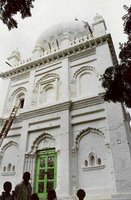
By Shubha Chacko and Sanjay Biswas - Deccan Herald - India
Tuesday, February 28, 2006
Post Babri Masjid and the genocide at Gujarat, the tag of an uncivilised intolerant India haunts many of us. Stunned and ashamed we are; but despair we need not, if we recognise that such acts are motivated politically and thrust on an India which has also worked out, through centuries, complex methods of encouraging diverse cultural and religious expressions within the broad unity of the country.
Ilkal is the microcosm of this India where a unique experiment in syncretism had begun some nine hundred years ago and that tradition continues till date.
The tea shop at the Ilkal bus station is highly recommended to all intrepid travellers. Half the Hindu pantheon, of Gods and Goddesses, bedeck the wall, but the centre stage is held by a man dressed in white. If the weavers have given this little dusty town a strong economy it is this man Mahanta Swamy, with his friend Hazarat Sayyed Shah Murtaza Qadri, who have made this town in central Karnataka a synonym for harmony and peace. For the hundreds of thousands who, like us, flock to Ilkal every year - it is a pilgrimage, a refuge to seek during troubled times. So when we asked the owner of the teashop the direction to the dargha he becomes animated in talking to us of this friend of the Mahanta who lies buried there.
We made our way to the dargha a whitewashed large structure with an immense courtyard where kids played, cooks sweated over huge pots and the faithful offered prayers. We were chatting with the mullah in front of the building when a group came up to make an offering of coconuts. The mullah broke open the coconut and the water was used to bless the devotees. There are curious features in the dargha. There is a small shrine dedicated to a lingayat disciple of the Sufi where we found a flock of recently bathed Bengalis worshipping, eating and, of course, talking politics. Each feast day a procession from either the math or the dargha winds its way through the town to celebrate the festival of the other. On the annual festival day — the Urs a pot of sandalwood paste and a piece of green silk cloth is taken in a procession from the house of one Nar Singh Chauhan to the dargha where he, the Chauhan, places a crown on the head of the resident mullah.
This tradition of syncretism did not take root overnight. It has had a tortuous journey of nine hundred years where internal struggles and external influences have tried to derail the dreams and visions of Basava, the Sufis and most of their followers. It is heartening that the people of the area have stuck together through these vicissitudes to internalise a harmonious existence and culture.





1 comment:
I enjoyed this article by shuba Chacko and sanjay biswas tremendously. It is well written, interesting and a new way of seeing things.
Thank you for posting this
May the tradition of religious pluralism blossom
Tarunabh
Post a Comment